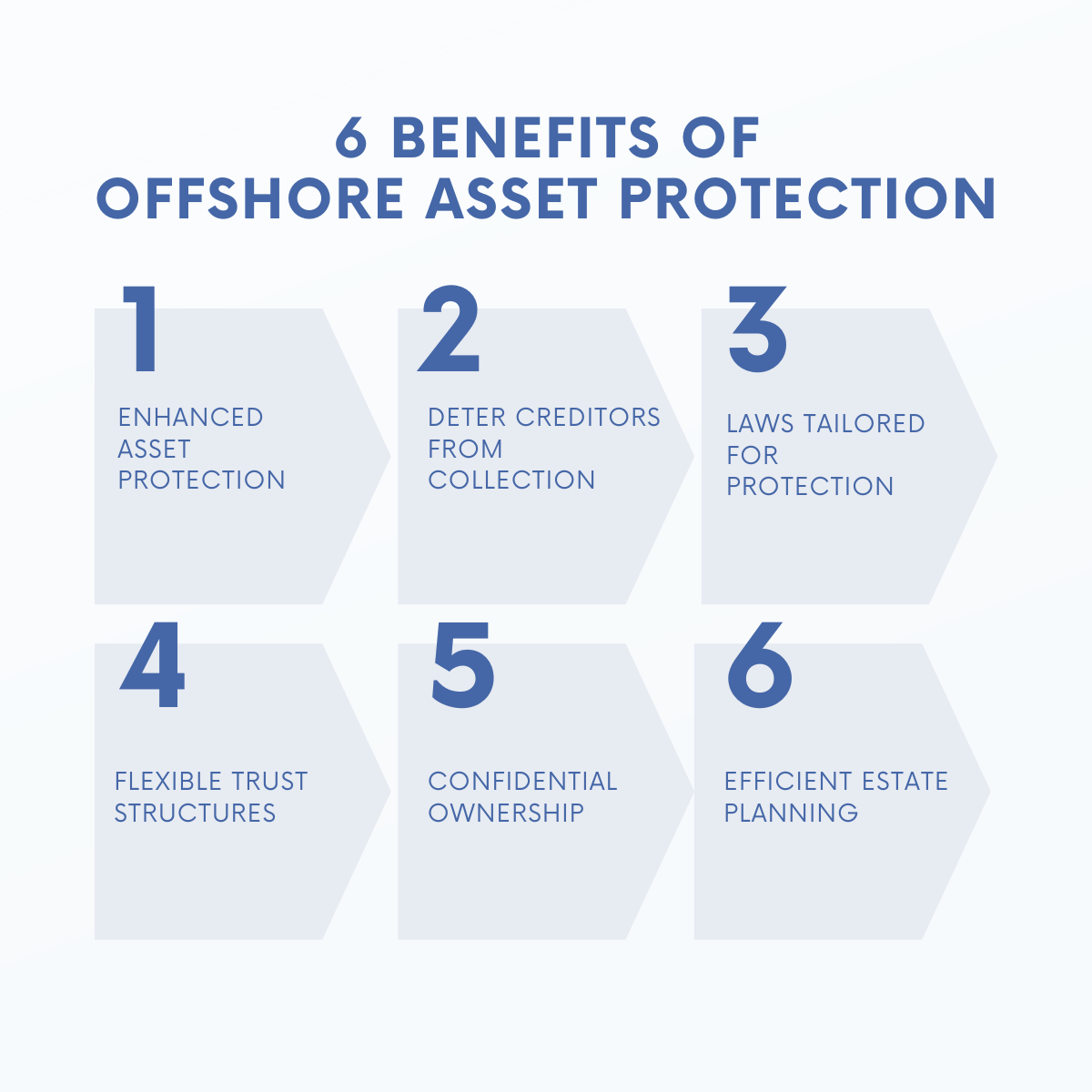An Offshore Asset Protection Trust is a sophisticated financial planning tool designed to safeguard assets from potential creditors and legal judgments. By establishing a trust in a jurisdiction with favorable legal protections, you can achieve a higher level of security and privacy for their wealth.
What Is an Offshore Asset Protection Trust?
An offshore asset protection trust is a type of trust set up in a foreign country with favorable asset protection statutes.
Unlike domestic trusts, offshore asset protection trusts are subject to the laws of the country in which they are established, which often provides mechanisms to shield assets from foreign judgments and creditors.
Benefits of Offshore Asset Protection Trusts
The primary reason most people set up an offshore trust is to protect their assets in a foreign country. Offshore asset protection trusts are one the go-to asset protection tools recommended by asset protection attorneys.
Offshore asset protection trusts are not only for the wealthy. They are also for people who want to protect their assets from lawsuits, creditors, and other legal claims. In summary, the benefits are:
- Enhanced Asset Protection:
- Offshore trusts can help you defend against creditors, lawsuits, and judgments. The legal hurdles that a creditor must overcome to breach the trust in a foreign jurisdiction are significant.
- Privacy and Confidentiality:
- Many offshore jurisdictions offer high levels of confidentiality.
- Estate Planning:
- Offshore trusts can work within an existing estate plan.
Key Advantage
A key advantage of using an offshore asset protection trust is that favorable offshore jurisdictions have a short statute of limitations on fraudulent transfer claims.
While most states have a four-year statute of limitations, offshore trusts are subject to only two years.
The shorter statute of limitations makes it easier for debtors to delay collection until after the statute of limitations has expired to challenge asset protection transfers.

Popular Jurisdictions for Offshore Trusts
Several jurisdictions are renowned for their asset protection laws. Some of the most popular include:
- Cayman Islands:
- Known for their strong privacy laws and absence of direct taxes, the Cayman Islands offer a secure environment for assets.
- Cook Islands:
- Located in the South Pacific, the Cook Islands have a well-established legal framework for asset protection trusts, including barriers against foreign judgments.
- Belize:
- Belize offers modern trust laws, which include excellent asset protection features and efficient handling of trust formations.
In my opinion, the Cook Islands and Nevis are the jurisdictions with the most favorable asset protection laws in the world. In particular, the Cook Islands trust is considered the world’s most effective and safest offshore asset protection structure.
The Cook Islands have a long history of favorable case law that provides legal assurance that a U.S. debtor’s assets will be well protected under its laws.
We help protect your assets from creditors.
We offer customized offshore asset protection planning for clients nationwide. Get answers for your specific situation by phone or Zoom.

Steps to Establish an Offshore Asset Protection Trust
- Choose a Jurisdiction:
- Research and select a jurisdiction that aligns with your specific needs for privacy, asset protection, and legal stability.
- Select a Trustee:
- Typically, the law of the offshore jurisdiction will require that the trustee be a resident or a licensed trust company based in that jurisdiction. Choosing a reputable and experienced trustee is critical.
- Draft the Trust Deed:
- Draft a trust deed that specifies the terms, conditions, and beneficiaries of the trust.
- Transfer Assets:
- Fund the trust with assets such as cash, stocks, real estate, or other investments. This step often involves significant coordination and legal oversight to ensure that the transfer complies with both domestic and international law.
- Continuous Management and Compliance:
- Regular management and reassessment of the trust are required to ensure that it complies with legal standards and serves the intended purpose. This includes annual filings, if necessary, and regular communication with the trustee.
How Does an Offshore Asset Protection Work?
A trustee in the offshore jurisdiction manages the trust, and the person who establishes the trust can still benefit from the assets.
Since the assets are legally owned by the trust and not the individual, it becomes more challenging for creditors or legal entities to claim them.
For judgment creditors to reach assets in such jurisdictions, a creditor must start over and institute a lawsuit against the defendant to establish a new judgment in the foreign court system.
How Is Offshore Asset Protection Taxed?
Offshore asset protection trusts are taxed as grantor trusts.
Any offshore asset protection requires IRS tax filings to report and disclose the ownership of foreign entities and money held, directly or indirectly, in foreign bank accounts, such as a Swiss bank account. The tax filings are informational, and offshore asset protection planning does not reduce or increase U.S. income tax liability.
Any type of offshore asset protection is complicated because of IRS reporting requirements applicable to foreign entities. People considering offshore asset protection should consult with a tax attorney or a CPA experienced in international tax law.
There are severe penalties for failure to comply with foreign entity reporting requirements. The tax reporting requirements are one of the reasons we usually try to accomplish asset protection with domestic tools under Florida exemptions before recommending more sophisticated offshore entities.
Frequently Asked Questions
How does an offshore asset protection trust work?
An offshore asset protection trust allows you to protect your assets by moving them to another jurisdiction. The trust is managed by a trustee company, often in the Cook Islands. Offshore asset protection trusts are a legal way to protect assets from judgment creditors in the United States.
What does an offshore asset protection trust do?
Offshore asset protection trusts are created to protect assets from creditors, legal judgments, and other financial threats by placing them under the jurisdiction of a country with laws that are more favorable to asset protection. These trusts are designed to make it significantly more challenging for creditors to access the assets held within the trust.
How much does an offshore asset protection trust cost?
A typical offshore asset protection trust plan costs between $15,000 and $25,000. More complicated situations will cost more.
How long does it take to set up an offshore asset protection plan?
About 2-3 months. You have to develop the plan with an attorney, file an application with the offshore trust company, complete a background check, sign the trust documents, and then transfer the assets to the offshore trust.
How safe is offshore asset protection?
Offshore asset protection is safe if you choose a reputable, licensed, and insured trustee company. Your attorney can help you pick the best country and trustee company for your situation.
Is offshore asset protection legal?
Yes, offshore asset protection is legal. Unless there is an injunction prohibiting you from transferring your assets, it is not a crime to transfer your assets to an offshore trust.









